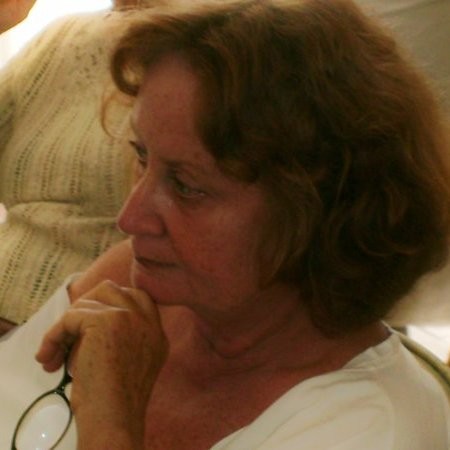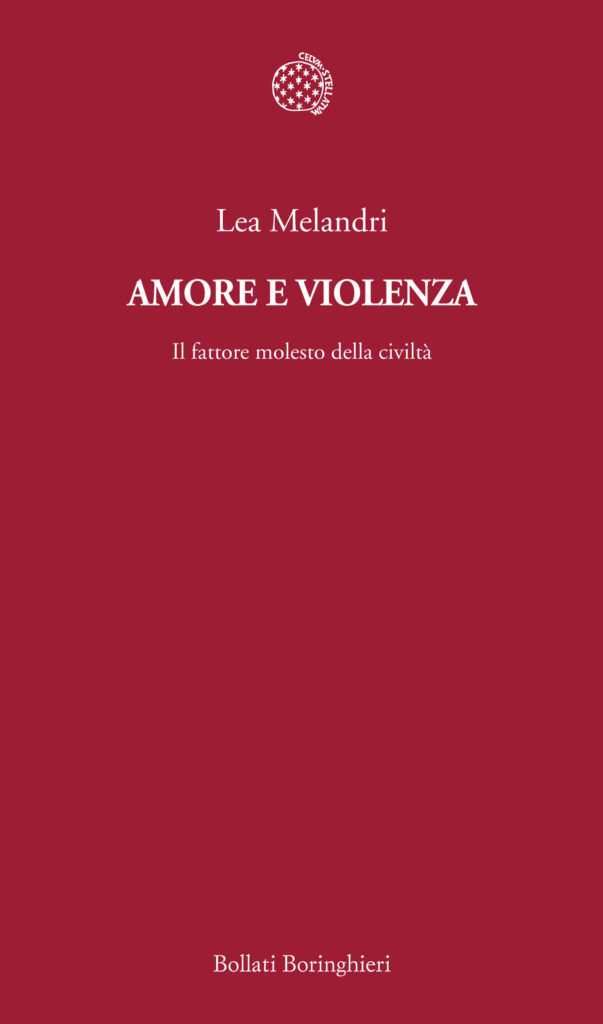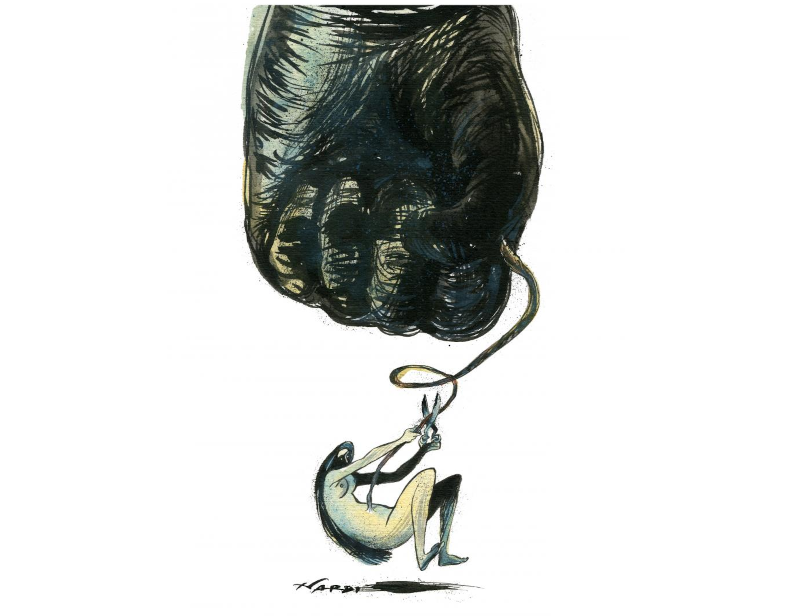
Lea Melandri (1941) is an essayist, writer and journalist. She is an established figure in Italian feminism. Her latest book is Love and Violence: The Vexatious Factors of Civilization (Albany: State University of New York Press, 2019). More of her writings can be found at Lea's Archive.
Male domination has a certain peculiarity compared to others. Can you explain how?
Lea Melandri: Of all the forms of domination throughout history, the male form is quite special in that it involves the most intimate things, such as sexuality, motherhood, family relationships.

Men are the children of women: they encounter another person’s body, the one that generated them, at the moment of their greatest dependence and helplessness. That body has them at its mercy for the first few years of their lives, through care or abandonment. It is the same type of body that they will encounter in their adult love life, but in an inverted position of power.
By confining women to the role of mother, men have also forced themselves to wear a mask of virility that is always under threat, to establish constraints deemed indispensable, even when they are not necessary. The dream of love – as the intimate belonging to another being, as unity in the twosome, an extension of the original bond between mother and child – carries within itself the risk of violent separation, linked to each individual's need for autonomy.
Gender roles, in their complementarity and hierarchical placement, shape power relationships. At the same time, they push towards an ideal, towards a harmonious reunion of inseparable parts of the human being: body and mind, feelings and reason. It is this blurring of love and violence that, even today, hinders people's awareness of sexism.
You write: "Instead of merely deploring violence, calling for harsher punishments for aggressors, more protection for victims, perhaps it would be more sensible to cast a glance where we do not like to see that violence appear." What are these "zones", these places of politics and the soul?
Perhaps we can begin with what was the great "challenge", or revolution, of 1970s feminism: the discovery that for millennia the most universal experiences of the human – sexuality, motherhood, birth, death, family ties – had been considered "non-political" and were confined to the "private" and to the order of "nature". As such, they were destined to remain "permanences".
What we are still inclined to consider "places of the soul" have always belonged to history, culture, and politics. The slogan "the personal is political" was intended to recognise that in individual lives, in personal experiences, as well as in the memory of the body, there are treasures of culture yet to be discovered, there is an unwritten history, which will not be found in any textbook or in any existing knowledge or language.
It is in these "zones" outside the public sphere and discourse, cloaked by modesty and ignorance or by "unspeakability", that the generation of that era looked for the roots of the separation between politics and sexuality, between the different destinies of men and women, as well as for the origin of all dualism: biology and history, individual and society.
"A monster is an exception, a person for whom society does not have to take responsibility. But monsters are not sick, they are the healthy children of patriarchy, of rape culture. Femicide is not a crime of passion, it is a crime of power", Elena Cecchettin
The first form of violence that we became aware of in those years could only be what I have called "invisible violence" or "symbolic violence": a male representation of the world that women themselves have forcibly made their own, or "incorporated". It is no coincidence that the victim speaks the same language as the aggressor. What else could women do but wedge themselves into those roles – "mothers of", "wives of" – while trying to wrest some power and pleasure.
We were a generation that rebelled against mothers. They were seen as a channel for the law of fathers, and one of the knots we found ourselves digging into the hardest was, not surprisingly, the mother/daughter relationship. We discovered that the most violent dispossession that women had suffered was that of being erased as "persons", and instead being identified with the body – the erotic body or the maternal body – and reduced to "functions".
At that point, we should have thrown open the doors of the home, and questioned coupling and family ties in all their ambiguity. We should have brought violence into the open in its "manifest" forms: mistreatment, exploitation, femicide. If we did not deal with domestic violence until much later, at the beginning of the 2000s, it is because love acted as a veil – even for those who, as in my case, had witnessed violence against the women in their families over many years. Today, faced with a relentless string of femicides, it is easy to cry out against the "monster", to demand harsher penalties. It is more difficult to ask whether it is not love – as we have inherited it, intermingled with power – that should be questioned. It is no coincidence that love has also remained a taboo for feminism.
Feminism is in some ways the ultimate tragedy, but before it (and even without it) there have been forms of violence and control that are established in "normal" and "happy" love lives. How can we explain that men who kill the women they love are the "healthy children of patriarchy"?
After half a century of feminist theory and practice, it is only today that we are beginning to talk about patriarchy as a "structural phenomenon". It has been a great step forward to speak of femicides not just as crimes, as pathologies of the individual, or as the result of backward cultures. But much remains to be done to recognise that "manifest" violence is only the most savage, archaic aspect of a widespread culture that has become the norm.
I have always preferred the term "male domination", or "sexism", rather than "patriarchy", perhaps because I have been hesitant to face the ambiguity of a kind of power that conflated the face of a tender son with that of a master father. If men were only the winning and confident sex, they would have no need to kill; if women saw only a murderer in the man who threatens their lives, they would not hesitate so often to denounce the violence they suffer. Today, men kill because when faced with women's freedom – with the fact that they are no longer a body at their disposal, hitherto considered a "natural" male privilege – men discover their fragility and dependence. In public life, together with other men, they are free. But inside the home they seem never to have lost that umbilical cord, and have essentially remained children, even of wives or lovers much younger than themselves.
We can now say that "patriarchy" is a worldview that has shaped learning as well as common sense, and which in history carries the stamp of a male-only community, but which women have themselves internalised. If it has become the "normality", it is because it has long remained in the "private" sphere and within the framework of unchanging natural laws.
You quote Bourdieu's Masculine Domination, published in 1988. He speaks of love as "the supreme form, because it is the most subtle, the most invisible form of symbolic violence".
Before reading Pierre Bourdieu's Masculine Domination – a book I loved and reviewed despite the fact that it did not get the circulation it deserved in Italy – the theme of love had already crossed my personal and political path. At the end of the 1970s, when the focus was largely on sexuality and homosexuality, and issues relating to the subconscious, I realised how important the need for love was for me – and indeed how strongly it was linked to the "dream of love", that of fusionality, of intimate belonging to another being.
At the beginning of the 1980s I began a lengthy period of study. I discovered Sibilla Aleramo's Diario di una donna, and I had an "agony aunt" column in a magazine for teenagers called "Ragazza In". Those were the years when I wrote what I consider my most personal book: "Come nasce il sogno d'amore" ("How the dream of love is born"). I should really have entitled it "How the illusion of love ends" – that dream of "unity in two" as Aleramo would define it, that "sacrilegious act from the point of view of individuality" – after being pursued through an untold number of "loves" and "mistakes".
"Today, faced with a relentless string of femicides, it is easy to cry out against the "monster", to demand harsher penalties. It is more difficult to ask whether it is not love – as we have inherited it, intermingled with power – that should be questioned"
From that time on, I have often written about the dream of love as "invisible violence", and wondered whether this was the strength or weakness of women, whether their deepest "slavery" should not be sought precisely in the power of making themselves indispensable to the other, in making life "good" for the other.
The merit of Bourdieu's book is to have analysed in depth the constructions of gender – the masculine and the feminine – in those "permanences" found in the most diverse historical and political contexts, to have recognised how male domination has been a colonisation of minds, as well as of bodies, and, in particular, to have questioned the ambiguity of the dream of love. In the last chapter of the book, Bourdieu asks whether love, as a fusion, a dissolution in the other, is a "truce" – an "oasis" in the war between the sexes – or the supreme form of that war since, the most invisible and insidious form of "symbolic violence". It was the same conclusion I had come to in my feminist journey. That a man should recognise this was something I could only welcome.
Can we talk about love in a different way?
I think that alternatives only begin to emerge when one has analysed the evil in depth, and in terms of the perverse knot between love and violence. I think there is still a long way to go. Of particular interest from this point of view is bell hooks's book, All About Love, and also Francois Jullien's essays, On Intimacy, Far from the Din of Love, Next to her, Opaque Presence, Intimate Presence.
What has changed in recent years, after #MeToo and in the wake of current events? When we talked on the phone, the debate on the murder of Giulia Cecchettin was fresh, and you told me, "I hear in the newspapers the discourse that we, the feminists, have been making for years". What happened?
A big change came, even more than from #MeToo – which almost became just a media trial of celebrities – from the most recent waves of feminism, starting in the early 2000s. In 2007 in Italy there was the first big demonstration, promoted by the group "Sommosse", in which we saw banners on domestic violence and the slogan "The murderer has the keys to the house".
They had finally cast their eyes into the family home, into family relationships. The violence that had always been present there, but concealed by the ambiguous issue of privacy, now appeared in the open. In bringing sexism into the political discourse, the national and international reports on the causes of women's deaths counted for a great deal. So too did the uninterrupted sequence of femicides, unfortunately.
Also important was the birth of the "Ni Una Menos" network in 2017, which originated in Argentina. Since then, huge demonstrations have been held every year on 8 March and 25 November. These have never been given the prominence they deserved.
In this latest feminist "tide", what has been new to me is the broadening of the discourse to all forms of domination: sexism, classism, racism, colonialism, etc. The radical demands of 1970s feminism are back, for "changing the self and the world". The challenge has been to start from the place furthest from politics – the self, personal experience – in order to invest and "disrupt" the learning and power of public life.
While recognising the essential legacy of half a century of feminism, the "unforeseen" leap in historical consciousness occurred in Italy with the femicide of Giulia Cecchettin, the student killed by her ex-boyfriend on 11 November 2023. It was the words of Elena, the victim's sister, and her father Gino Cecchettin, that opened an unexpected breach in Italy's culture and media, which are both still fundamentally macho.
Rather than being locked up in the privacy of a damaged family, this story of yet another femicide has for the first time seen the doors of the home opened to let out ideas hitherto only heard in feminist demonstrations. Only a "father" capable of looking beyond his parental role and thinking of himself as a "man" among men, with a masculinity that today includes the need to question oneself on the subject of its most violent expressions, might eclipse the figure of the patriarch, to whom some still look back with ill-concealed regret.
It has been the turn of the father and daughter figures to break through the armour of family roles, to question the "normality" of atavistic prejudices that have "privatised" and "naturalised" historical power relations. The words of Giulia's sister were in themselves a turning point from which there is no going back: they were the slogans and truths shouted by generations of feminists coming out of narrow and ignored spheres for the first time, to be heard and taken up in the most diverse parts of public life.
"A monster," said Elena, "is an exception, a person for whom society does not have to take responsibility. But monsters are not sick, they are the healthy children of patriarchy, of rape culture. Femicide is not a crime of passion, it is a crime of power. We need widespread sexual and emotional education, we need to teach that love is not possession."

In partnership with the European Data Journalism Network
Was this article useful? If so we are delighted!
It is freely available because we believe that the right to free and independent information is essential for democracy. But this right is not guaranteed forever, and independence comes at a cost. We need your support in order to continue publishing independent, multilingual news for all Europeans.
Discover our subscription offers and their exclusive benefits and become a member of our community now!












